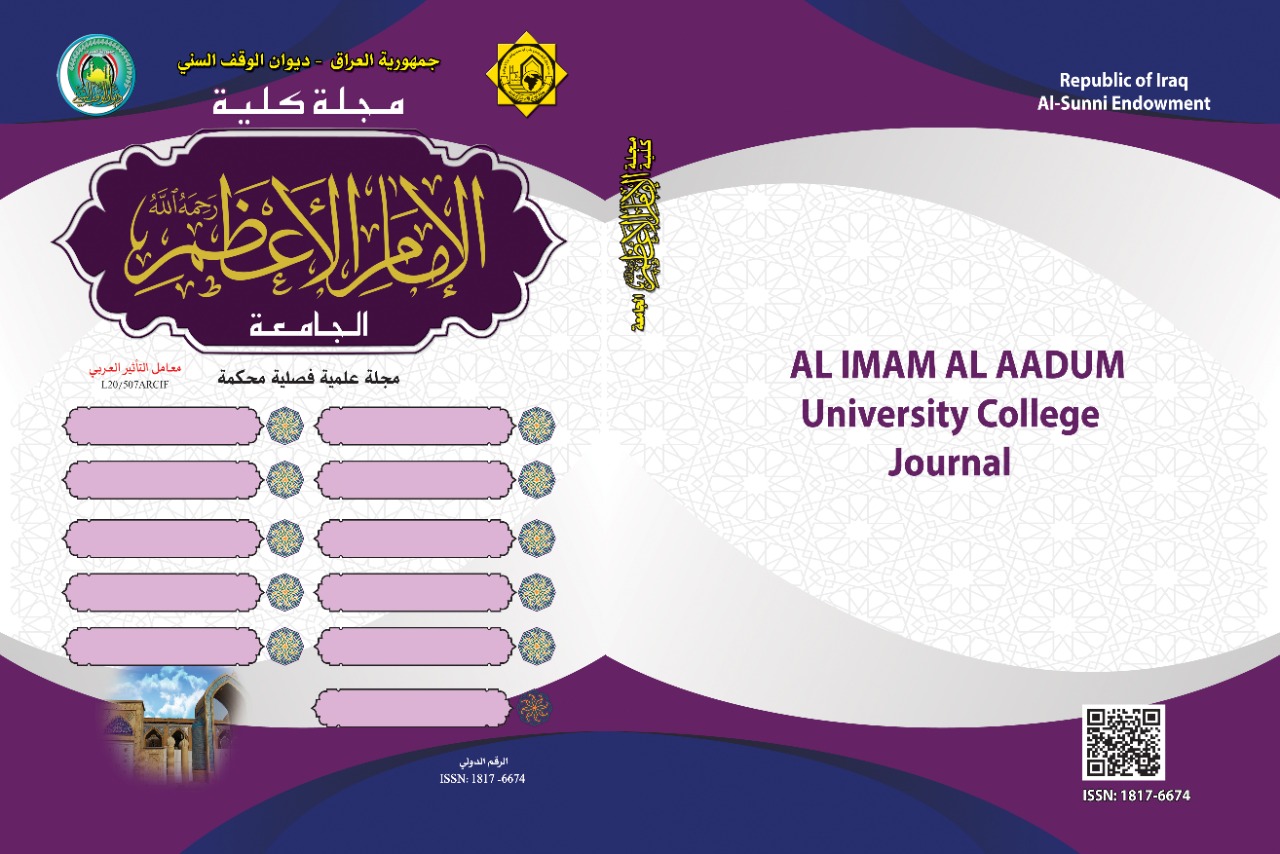Abstract
This research aims to present a controversial grammatical issue that deals with
the occurrence of the sentence as a subject or deputy agent of the subject. The study
has proved that there is a dispute between the Basris and the Kufis about this issue.
Furthermore, it replies back to some researchers who deny that this issue has been a
controversial between those two famous grammarian schools.
The Optionlists clarifies that the occurrence of a sentence, as a subject or its deputy,
is optional with no conditions. Whereas others assert the conditions.
The research also sheds some light on some of the opponent ‘ point of views concerning
this type of occurrence and discusses them in detail .In addition , the study
identifies Sibawayh’s approach to this issue, and whom many grammarians and interpreters
differs among themselves about it , i.e., some of them state that Sebawaya
allows the occurrence while others deny his support .
At last, the researcher gives his point of view which is the optionality of the sentence
occurrence but, under certain conditions :(a) the correct form, (b)the integrity
of the meaning and (c) not to resort to exaggerated interpretations which spoil the
intended meaning.
the occurrence of the sentence as a subject or deputy agent of the subject. The study
has proved that there is a dispute between the Basris and the Kufis about this issue.
Furthermore, it replies back to some researchers who deny that this issue has been a
controversial between those two famous grammarian schools.
The Optionlists clarifies that the occurrence of a sentence, as a subject or its deputy,
is optional with no conditions. Whereas others assert the conditions.
The research also sheds some light on some of the opponent ‘ point of views concerning
this type of occurrence and discusses them in detail .In addition , the study
identifies Sibawayh’s approach to this issue, and whom many grammarians and interpreters
differs among themselves about it , i.e., some of them state that Sebawaya
allows the occurrence while others deny his support .
At last, the researcher gives his point of view which is the optionality of the sentence
occurrence but, under certain conditions :(a) the correct form, (b)the integrity
of the meaning and (c) not to resort to exaggerated interpretations which spoil the
intended meaning.
Abstract
هذا البحث يهدف إِلى عرض مسألة نحويَّة خلافيَّة، وهي: وقوع الجملة فاعلً أَو نائبًا عن الفاعل.
أَثبت البحث وقوع الخلاف فيها بين البصريِّين والكوفيِّين، وردَّ قولَ بعض الباحثين مَن نفى أَنْ تكون هذه
المسألة خلافيَّة بين المدرستين النَّحويَّتين المشهورتين.
وذُكِرَ المجوزون لوقوع الجملة فاعلً أَو نائبًا عن الفاعل، فمنهم من جوَّز وقوع ذلكَ بدون شرط، ومنهم
من جوَّز وقوعه بشروطٍ.
وذَكَرَ البحث حجج المانعين وناقشها.
وحدَّد رأي سيبويه الَّذِي اختلف النُّحويُّون والمفسرون في بيان رأيه فيها، فمنهم من نسب إِليه المنع، ومنهم
من نسب إِليه الجواز.
ثُمَّ ذكر الباحث رأيه، وهو جواز وقوع الجملة كذلكَ بشرط صحة التَّكيب واستقامة المعنى، وعدم اللُّجوء
إِلى التَّأويلات المتكلِّفة المُفسدة للمعنى.
أَثبت البحث وقوع الخلاف فيها بين البصريِّين والكوفيِّين، وردَّ قولَ بعض الباحثين مَن نفى أَنْ تكون هذه
المسألة خلافيَّة بين المدرستين النَّحويَّتين المشهورتين.
وذُكِرَ المجوزون لوقوع الجملة فاعلً أَو نائبًا عن الفاعل، فمنهم من جوَّز وقوع ذلكَ بدون شرط، ومنهم
من جوَّز وقوعه بشروطٍ.
وذَكَرَ البحث حجج المانعين وناقشها.
وحدَّد رأي سيبويه الَّذِي اختلف النُّحويُّون والمفسرون في بيان رأيه فيها، فمنهم من نسب إِليه المنع، ومنهم
من نسب إِليه الجواز.
ثُمَّ ذكر الباحث رأيه، وهو جواز وقوع الجملة كذلكَ بشرط صحة التَّكيب واستقامة المعنى، وعدم اللُّجوء
إِلى التَّأويلات المتكلِّفة المُفسدة للمعنى.
